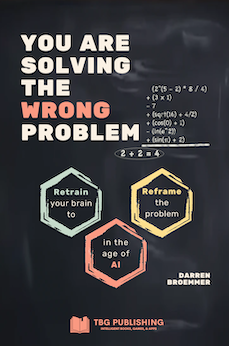
Asking the Right Questions for Effective Problem Solving
Category: Self Improvement
Tags: Problem Solving
Problem-solving is an integral skill in both our personal and professional lives. However, simply having domain knowledge is often not enough to devise innovative solutions to complex issues. We need to master the art of asking the right questions to thoroughly understand problems and uncover optimal solutions.
This article provides actionable techniques to reframe problems and ask insightful questions that get to the heart of the matter.
The Power of Reframing Problems
Albert Einstein once famously said, “If I had an hour to solve a problem, I'd spend 55 minutes thinking about the problem and 5 minutes thinking about solutions.”
His quote emphasizes the importance of taking time to deeply comprehend the actual problem before jumping to solutions.
"Reframing" problems requires you to approach them from different angles. This technique entails dissecting the outward symptoms of a problem to reveal the underlying root causes. It’s crucial to differentiate between symptoms and causes, just as a doctor investigates symptoms to diagnose the disease.
Reframing a problem brings several advantages:
- It compels you to articulate the issue clearly in writing, enhancing understanding
- It allows you to view the problem through your customer’s eyes, avoiding assumptions
- It enables you to ask better questions and gather empirical data, rather than relying on intuition
- Most importantly, reframing sets the stage for uncovering innovative solutions that provide lasting improvement.
Cultivating an Investigative Mindset
When reframing a problem, it’s helpful to take on the mindset of a detective or investigator. This involves exhibiting genuine curiosity and persistently asking "why" questions to unravel all facets of the issue. Trace problems back to their origins before deciding where to focus your attention.
It’s crucial to gather comprehensive empirical data through experiments and interviews. Speak to both experts entrenched in the details and those with a broader view. Ask simple or "dumb" sounding questions without embarrassment. Avoid leading questions that influence answers. Above all, listen intently to understand all perspectives.
Using the “5 Whys” Technique
A useful framework for getting to root causes is the "5 Whys" technique. Ite was developed by Sakichi Toyoda, the founder of Toyota Industries, in the 1930s, although it did not become widely popular until the 1970s.
When facing a problem:
- Clearly articulate the top-level problem
- Ask yourself “Why does this problem happen?” and note down the answer
- Determine if your answer reflects the true root cause. If not, ask “Why?” again about your previous answer.
- Repeat this process, tracing back the causal factors until reaching the root.
- Challenge your assumptions during the process.
While 5 iterations are suggested, complex issues may require further questioning. The key is to doggedly track down root causes before implementing solutions.
Types of Questions to Expand Your Knowledge
Interview questions typically either confirm what you already know or expand your knowledge. Tom Pohlmann and Neethi Mary Thomas from Mu Sigma discuss the different types of questions you can use. To gather richer insights:
- Ask Clarifying questions to prevent going down irrelevant tangents
- Use Funneling questions to understand how people arrived at conclusions
- Explore related issues with Adjoining questions
- Take a big picture view using Elevating questions It’s also helpful to distinguish between questions that illuminate facts, behaviors, opinions, and emotions. Align your objectives with suitable question types.
The Takeaway
Mastering the art of asking the right questions leads to clarity and breakthrough solutions. Reframe problems through different lenses, tracing symptoms back to their origins. Adopt a curiously investigative mindset when interviewing experts and those with fresh outlooks. Let these techniques spark your creativity in solving pressing problems!

